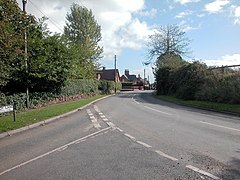Saighton
| Saighton | |
|---|---|
 Saighton Village |
|
| Saighton shown within Cheshire | |
| OS grid reference | SJ 443 619 |
| District | |
| Shire county | |
| Region | |
| Country | England |
| Sovereign state | United Kingdom |
| Post town | Chester |
| Postcode district | CH3 |
| Police | Cheshire |
| Fire | Cheshire |
| Ambulance | North West |
| EU Parliament | North West England |
Saighton (/ˈseɪtʌn/) is a civil parish and village in the unitary authority of Cheshire West and Chester and the ceremonial county of Cheshire, England, a few miles south of Chester. The 2011 Census recorded a population for the parish of 202. The parish is governed by a parish council. Much of the surrounding land is owned by the Duke of Westminster.
The village is said to take its name from the Old English of ‘salh’ and ‘tun’ which translates into ‘the settlement where willow grows’. The settlement predates the Norman Conquest and is mentioned in the Doomsday Book as 'Saltone'. Most of the land and buildings in Saighton are owned by the Duke of Westminster's Eaton Estate, which has been in the ownership of the Grosvenor family since the 1440s.
Saighton is described in 1870–72 in John Marius Wilson's Imperial Gazetteer of England and Wales as having a population of 272, 59 houses and a post office. In 1881 Saighton had a total population of 350, with most men working in farming, and most women who were employed working as servants. Saighton was a township in St. Oswald's ancient parish until 1866 when it became a civil parish.
Six men from Saighton who lost their lives in World War I are commemorated on the village's war memorial.
St Mary's Church is in the small settlement of Bruera, which lies between the villages of Saighton and Aldford, in Cheshire, England. It is designated by English Heritage as a Grade II* listed building. The church contains Norman elements, but it has been subjected to alterations and modifications, particularly in 1896. Its benefice is combined with other churches St Peter, Waverton, and St John the Baptist, Aldford.
...
Wikipedia

